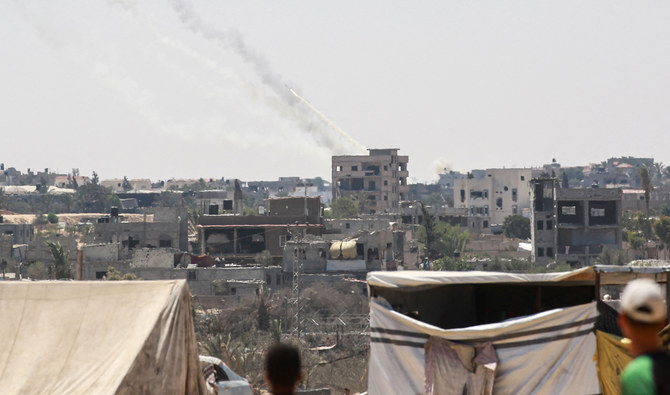ISLAMABAD: The Pakistan Ulema Council (PUC) on Tuesday called for unity among Muslim countries across the world for the resolution of Palestine issue.
The statement came after a Hajj Conference organized by the PUC in Islamabad, which was attended by Pakistan’s Minister of Religious Affairs Chaudhry Salik Hussain, Khyber Pakhtunkhwa Provincial Governor Faisal Karim Kundi, Saudi Arabia’s Ambassador to Pakistan Nawaf bin Saeed Al-Malki, Palestinian chargé d’affaires Nader Khamis Al-Turk, Pir Naqeebur Rehman, Allama Shabbir Hussein Messvi, Saad Nazeer, Sanaullah Khan and others.
The development came as death toll from Israel’s war on Gaza, which began after Oct.7, 2023 attacks by Hamas, reached at least 39,653 people, according to the Gaza health ministry. Palestinian officials said Israeli forces killed another 12 people in three separate raids in the northern West Bank on Tuesday as violence in the occupied territory showed no sign of abating.
The Organization of the Islamic Cooperation (OIC) has summoned an extraordinary meeting of its executive committee on Aug. 7 to discuss Israel’s ongoing aggression against Palestine and other regional states, which has raised fears of a wider conflict in the Middle East. The meeting was convened on requests by Palestine and Iran.
“The prevailing challenges require Muslim Ummah to get united and the Kingdom of Saudi Arabia and Pakistan have to play their respective role for the unity and stability of the Muslim Ummah,” the PUC quoted participants of the Hajj Conference as saying.
Speaking at the conference, the Palestinian chargé d’affaires said the time had come for the sacrifices of the people of Palestine to bear fruit.
“Palestine will came into being as an independent and autonomous state and we will say prayers inside Al-Quds,” Nader Khamis Al-Turk said.
Addressing the Hajj Conference, the Saudi ambassador said serving the Hajj pilgrims was a matter of pride for Saudi Arabia.
“Pakistan and Saudi Arabia are knotted in the eternal friendship and have relationship of faith and belief,” he was quoted as saying by the PUC. “It is the responsibility of the Embassy of Saudi Arabia in Pakistan to facilitate the Pakistani pilgrims to their best.”
The conference also adopted a resolution to laud the services of Saudi Arabia’s King Salman, Crown Prince Mohammed bin Salman and Saudi Minister for Hajj Dr. Tawfiq bin Fawzan Al-Rabiah for making best arrangements for this year’s pilgrimage.
The annual Islamic pilgrimage was held from June 14 till June 19, with millions of pilgrims from all parts of the world performing the rituals.
Out of Pakistan’s total quota of 179,210 pilgrims, around 160,000 from the country performed Hajj this year through both the government scheme and private tour operators, according to the religious affairs ministry.
Pakistan Ulema Council calls for unity among Muslim world to resolve Palestine issue
https://arab.news/2m6fr
Pakistan Ulema Council calls for unity among Muslim world to resolve Palestine issue

- The development comes as death toll from Israel’s war on Gaza reaches at least 39,653 people, according to Palestinian officials
- Pakistani minister, religious scholars hail King Salman, Crown Prince Mohammed and Saudi Hajj minister for best Hajj arrangements
Pakistan disburses record $9.2 billion agricultural loans in FY25, central bank says

- State Bank says farm lending rose 16 percent year-on-year to Rs2.58 trillion
- Inflation eased to 5.8 percent in January as GDP growth hits 3.7 percent in Q1 FY26
KARACHI: Pakistan disbursed a record Rs2.58 trillion ($9.2 billion) in agricultural loans during fiscal year 2024–25, a 16 percent increase from the previous year, State Bank of Pakistan (SBP) Governor Jameel Ahmad said on Thursday while chairing a meeting of the Agricultural Credit Advisory Committee (ACAC).
Agricultural financing is considered critical to Pakistan’s rural economy, where farming contributes nearly one-fifth of GDP and employs a large share of the workforce. The government has repeatedly emphasized expanding credit access to small farmers as part of broader efforts to boost productivity, stabilize food supply and support economic recovery under an IMF-backed reform program.
According to official data shared at the meeting, agricultural credit disbursement reached Rs2.58 trillion in FY25, marking a record high. In the first half of FY26 alone, banks disbursed Rs1,412 billion in agricultural loans, while the number of borrowers increased to 2.97 million.
“During fiscal year 2025, record agricultural loans of Rs2.58 trillion were disbursed, reflecting an annual growth of 16 percent,” the State Bank governor said, according to a statement issued after the meeting.
He added that Pakistan had regained macroeconomic stability and that the economy was moving toward sustainable growth.
The governor said GDP growth in the first quarter of FY26 stood at 3.7 percent, while full-year growth was projected between 3.75 percent and 4.75 percent.
He also noted that headline inflation had declined to 5.8 percent in January 2026.
The committee reviewed measures to further expand credit access, including greater use of the central bank’s Zarkhez-e scheme to facilitate agricultural lending. Members also discussed promoting electronic warehouse receipt financing to enhance post-harvest liquidity and reduce distress sales of crops.
The statement said the purpose of electronic warehouse receipt financing was to “reduce forced sales of crops and strengthen linkages within the agricultural market.”
Agricultural lending has been a focus of Pakistan’s financial inclusion strategy, particularly as policymakers seek to improve rural incomes, stabilize food prices and strengthen export-oriented crop production amid broader economic reforms.










